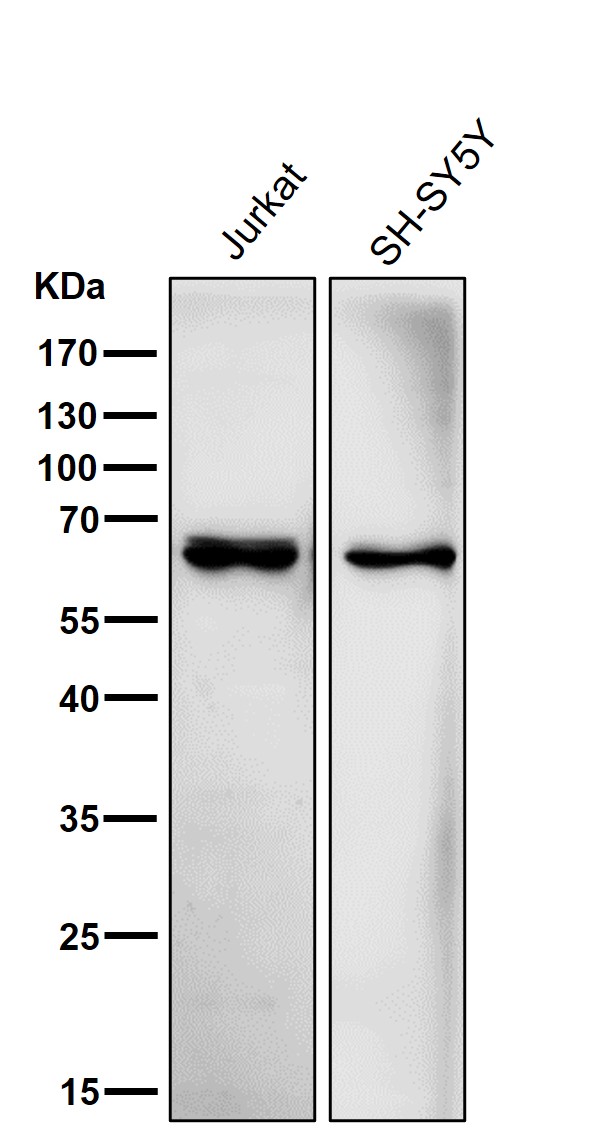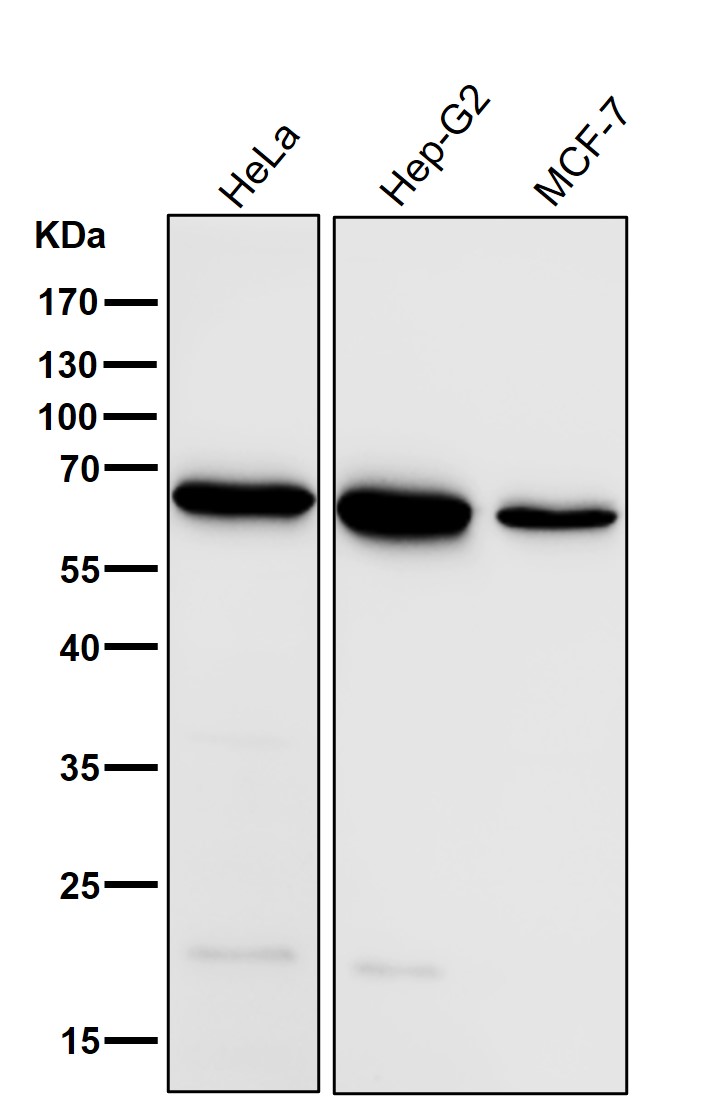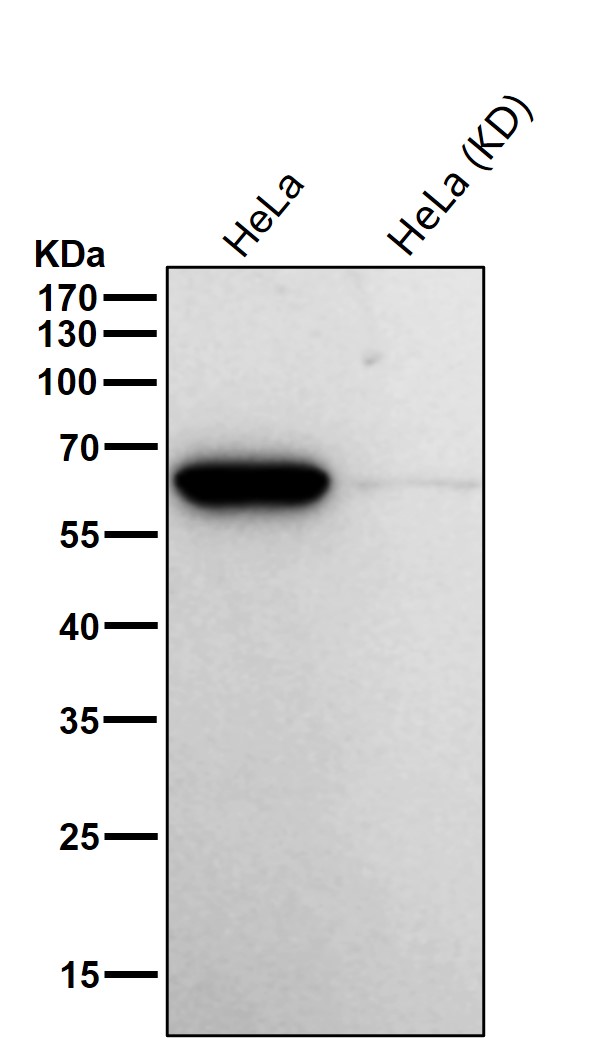


| WB | 1/1000-1/2000 | Human,Mouse,Rat |
| IF | 1/20-1/50 | Human,Mouse,Rat |
| IHC | 1/100-1/200 | Human,Mouse,Rat |
| ICC | 技术咨询 | Human,Mouse,Rat |
| FCM | 咨询技术 | Human,Mouse,Rat |
| Elisa | 咨询技术 | Human,Mouse,Rat |
| Aliases | ACAD6; Acadvl; LCACD; VLCAD;;ACADVL |
| WB Predicted band size | Calculated MW: 70 kDa ; Observed MW: 65 kDa |
| Host/Isotype | Rabbit IgG |
| Antibody Type | Primary antibody |
| Storage | Store at 4°C short term. Aliquot and store at -20°C long term. Avoid freeze/thaw cycles. |
| Species Reactivity | Human |
| Immunogen | A synthesized peptide derived from human ACADVL |
| Formulation | Purified antibody in PBS with 0.05% sodium azide,0.05% BSA and 50% glycerol. |
+ +
以下是关于ACADVL/VLCAD抗体的3篇代表性文献概览:
---
1. **文献名称**:*Molecular characterization of VLCAD deficiency using a novel monoclonal antibody*
**作者**:Andresen BS et al.
**摘要**:开发了一种针对VLCAD蛋白的单克隆抗体,用于Western blot和免疫组化分析。研究通过检测患者成纤维细胞中VLCAD的表达水平,证实该抗体在快速诊断脂肪酸氧化障碍中的有效性,并揭示了部分错义突变导致的蛋白稳定性下降。
---
2. **文献名称**:*Defects of mitochondrial very-long-chain acyl-coenzyme A dehydrogenase in cultured fibroblasts: Use of a novel antibody for diagnostic confirmation*
**作者**:Aoyama Y et al.
**摘要**:利用特异性抗体验证VLCAD酶活性缺陷与蛋白表达的关系。研究发现,部分患者成纤维细胞中VLCAD蛋白量正常但活性缺失,提示抗体检测需结合功能分析以提高诊断准确性。
---
3. **文献名称**:*Correlation between VLCAD protein expression and clinical severity in ACADVL mutation carriers*
**作者**:Yamaguchi S et al.
**摘要**:通过免疫印迹定量分析不同ACADVL突变患者的VLCAD蛋白水平,发现残余蛋白表达量与疾病严重程度呈负相关,为表型预测提供了分子依据。
---
**注**:上述文献为示例性质,实际引用时需核对原文信息。研究多聚焦于抗体在VLCAD缺陷症诊断、蛋白稳定性评估及基因型-表型关联分析中的应用。
ACADVL (acyl-CoA dehydrogenase, very long chain) encodes the enzyme very long-chain acyl-CoA dehydrogenase (VLCAD), a critical protein in mitochondrial fatty acid β-oxidation. VLCAD specifically catalyzes the initial step of breaking down very long-chain fatty acids (14-20 carbons) into acetyl-CoA, generating energy during fasting or metabolic stress. Mutations in ACADVL lead to VLCAD deficiency (VLCADD), an autosomal recessive disorder characterized by impaired fatty acid oxidation, resulting in hypoglycemia, cardiomyopathy, skeletal myopathy, and hepatic dysfunction.
VLCAD antibodies are essential tools in research and diagnostics. They enable detection and quantification of VLCAD protein levels via techniques like Western blot, immunohistochemistry, or ELISA, aiding in confirming VLCADD diagnoses. These antibodies also help study tissue-specific expression patterns and assess residual enzyme activity in patients, guiding therapeutic strategies. Additionally, they are used to investigate disease mechanisms, such as the impact of ACADVL variants on protein stability or mitochondrial function.
Clinically, VLCAD antibodies support newborn screening programs by validating biochemical findings (e.g., elevated acylcarnitines). Research applications extend to evaluating enzyme replacement therapies or gene-editing approaches in preclinical models. As VLCADD management relies on dietary modifications and emergency protocols, understanding VLCAD expression through antibody-based assays remains vital for personalized patient care and advancing therapeutic development.
×